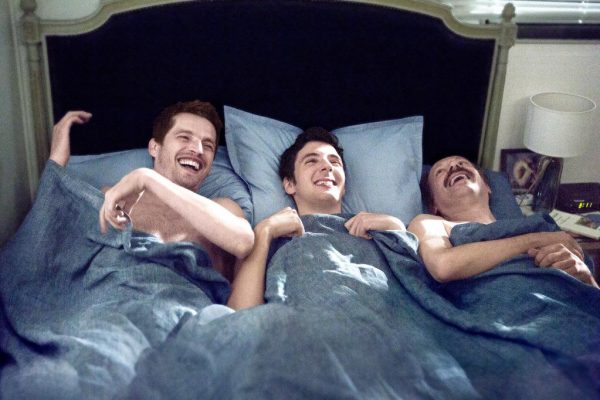@Filmhouse, Edinburgh from Fri 12 Apr 2019
French cinema is currently in a purple patch of LGBT releases with recent films like BPM (Beats Per Minute), and Sauvage becoming popular with arthouse audiences. Unruly, lusty and frank, these films attempt to depict gay life with a confrontational, punk aesthetic. Like BPM, Christophe Honoré’s new film takes place in 1993 with AIDS still decimating the community, but while being similar thematically it lacks the vibrancy and passion of Robin Campanillo‘s brilliant ensemble piece.
Sorry Angel follows the relationship between Jacques (Pierre Deladonchamps) and Arthur (Vincent Lacoste). Jacques is a 39-year-old author coming to terms with an AIDS diagnosis. Arthur is a student who has recently begun exploring his gay desires and is instantly attracted to the experienced and intellectual Jacques. Complicating issues are Jacques’ sensitive and intelligent young son Loulou, and Marco, a former boyfriend in the advanced stages of an AIDS-related illness. Arthur is still in a relationship with fellow student Nadine (Adele Wismes).
Honoré’s film is most assured in its depiction of three generations of gay experience. Jacques’ neighbour, middle-aged Mathieu (Denis Podalydès) comes across as somewhat diffident in his desires, perhaps implying he has spent much of his life closeted. Jacques is comfortable with his sexuality and still promiscuous, despite his ailing health. Arthur is louche and voracious; confident but still optimistic and romantic, which clashes with the understandable fatalism of Jacques.
Less successful is the meandering approach that fails to pin down a concerted emotional tone. After a hectic, choppily-edited intro which promises a more direct and urgent work, Sorry Angel settles into a series of mannered conversations and a disjointed pace that makes its many flatter moments feel interminable. This lessens the impact when Honoré decides to push Jacques and Arthur’s relationship, or during those moments where he aims for poignancy.
There are however moments of excellence that go some way to alleviating the sense of ennui. A flirtatious phone call during which Jacques categorises his types of men according to those described by his favourite poets is inventive and funny, while a strange and sombre fantasy in which Jacques bathes with the corpse of his former partner is somehow purely moving instead of macabre. This, along with fine performances, demonstrate Honoré’s talent but makes the film feel even more like a missed opportunity.
The central relationship is also troubling in terms of Arthur’s dismissal of Jacques’ illness as a problem. As he is clearly an analogue for the director, Arthur’s flippant attitude towards sex makes him a far less sympathetic character than he should be. With AIDS a constant vampiric spectre, it’s hard to square his behaviour, particularly the risk to which he subjects Nadine. It appears he’s using protection, but he annoyingly shrugs off any censure with arrogant insouciance, apparently embracing the romance in potentially doomed love.
Honoré has examined the symbiosis between sex and death before in his adaptation of Bataille‘s Ma Mère, but this is a far less transgressive work. LGBT cinema isn’t renowned primarily for being staid and polite, but next to the more firebrand recent releases like BPM and Sauvage, Sorry Angel is unengaging, self-indulgent and very ordinary.
